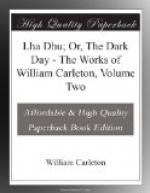What a tide of bewildered interrogatories does the
fifth urchin pour upon the ear of the old grandfather,
who is foolish enough to stop the whole group, in
order to relate the precocious pertinency of some particular
query. There goes a snug farmer, his wife, and
good-looking daughters, seated upon a farm-car that
is trussed with straw, covered by a blue quilt.
We will wager that some “good woman” has
somewhere about the premises a few cakes of hard griddle-wheat,
to eat when they get hungry, with a glass of punch,
and, it may be, a good slice or two of excellent hung
beef or bacon. But now they approach town, and
the stream thickens. There go the beggars, mendicants,
and impostors, showing a degree of agility rather
impracticable with their respective maladies, grievous
and deplorable as they all, of course, are; and toiling
vehemently after them, hops “Bill i’ the
Bowl,” pitching himself along in a copper-fastened
dish, with a small stool or
creepie supporting
each hand. But now the whole sweep of the town
and fair-green open to us; tents, and standings, and
tables, and roasting and boiling are all about us;
for the
spoileen fires are in operation, and
many a fat sheep will be cut up, as well for those
who have never tasted mutton before, as for hundreds
who eat rather from hunger than curiosity. Heavens!
what an astounding multitude of discordant noises
all blend into one hoarse, deep, drowsy body of sound,
for which we can find no suitable term. Cows lowing,
sheep bleating, pigs grunting, horses neighing, men
shouting, women screaming, fiddlers playing, pipes
squeeling, youngsters, dancing, hammering up of standings
and tents, thumping of restive or lazy animals, the
show-man’s drum, the lottery-man’s speech,
the ballad-singer’s squall, all come upon us;
and lastly, the unheeded sweep of the death-bell,
as it tells with sullen tongues that some poor mortal
has for ever departed from the cares and amusements,
the trade and traffic, of this transitory life.
About twelve o’clock the fair-tide is full;
for that is the time in which the greatest interchange
of property, and the most vigorous transactions of
business, with all accompanying bustle and activity,
take place. For an hour or two this continues.
About three o’clock the tide is evidently on
the ebb; business begins to slacken, and those who
have their transactions brought to a close, meet their
families and friends at the place of rendezvous—always
a public house. It is now, indeed, when the heat
and burden of the day have passed, and refreshment
becomes both grateful and necessary, that the people
fall into distinct groups for the purpose of social
enjoyment. If two young folk have been for some
time “coortin” one another, “the
bachelor,” which in Ireland means a suitor,
generally contrives to bring his friends and those
of, his sweetheart together. The very fact of
their accepting the “thrate,” on either
side, or both, is a good omen, and considered tantamount




